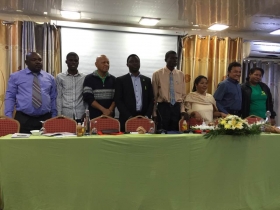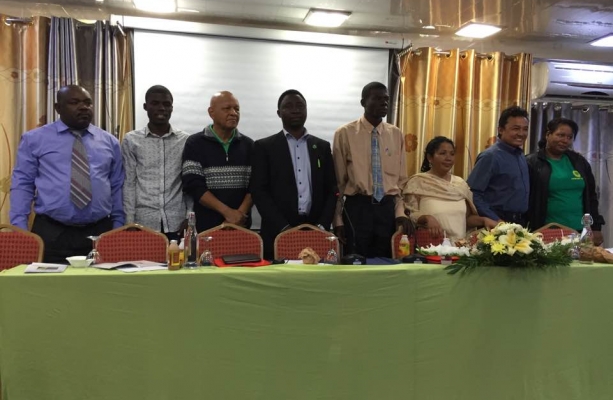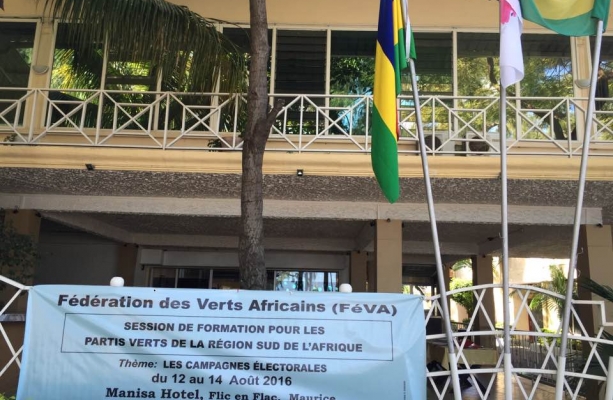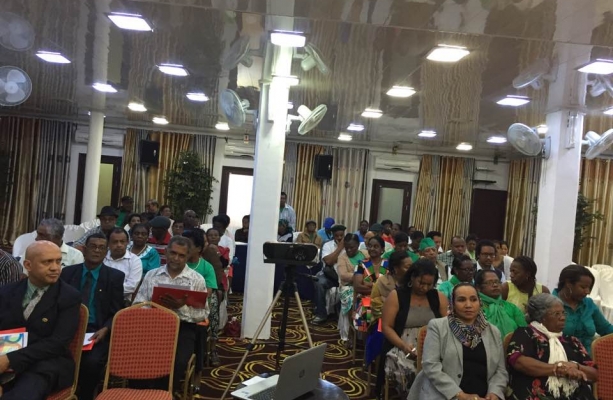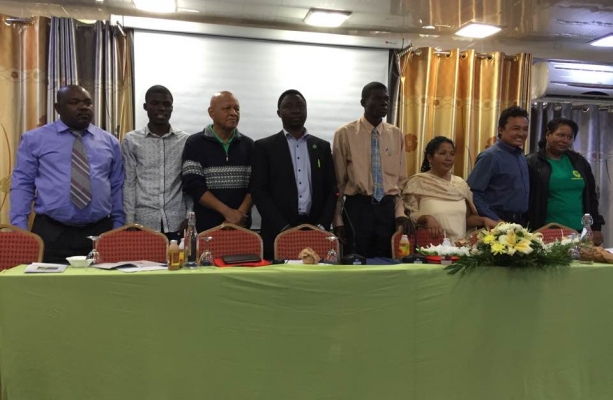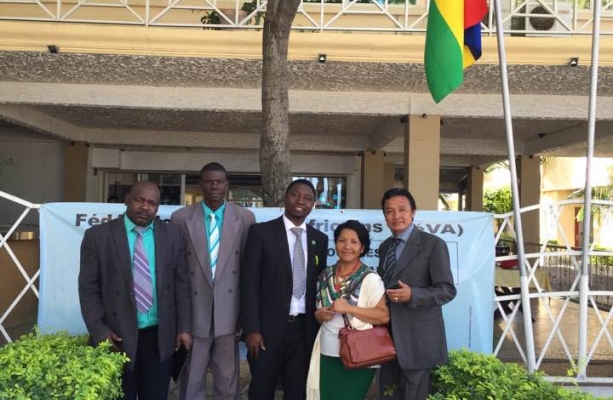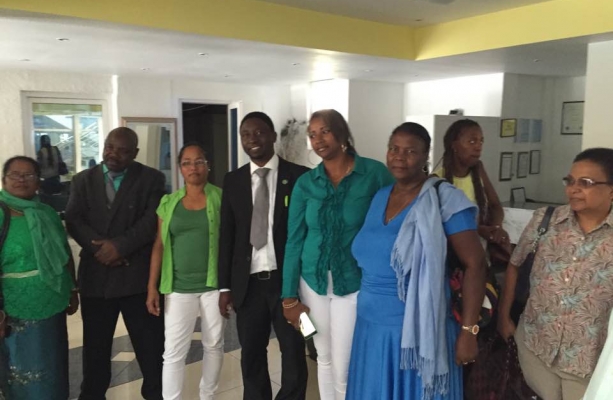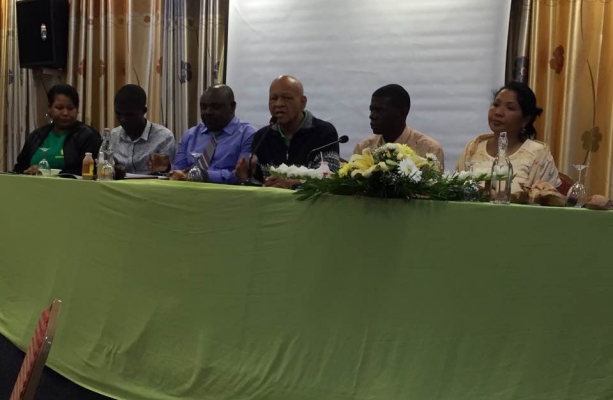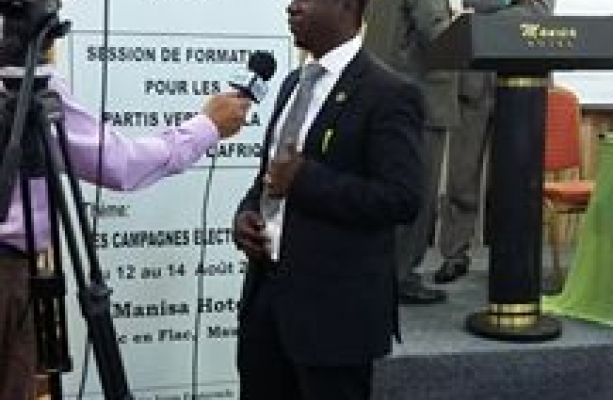You are here
Southern Africa Greens Federation Press Communique on Elections Training in Mauritius
The training session of the Southern Africa Greens Federation was held on 12 to 14 August 2016, at Manisa Hotel, Flic en Flac, in Mauritius, with representatives of Green Parties coming from Mozambique, Madagascar, Zimbabwe, Zambia and Mauritius, the host country. The main representatives at the session were : Dr Frank Habineza, President of the African Greens Federation (AGF) and Leader of the Democratic Green Party of Rwanda; Mr. Joao Massango, Leader of Partido Ecologista de Moçambique; Mr Kelvin Kaunda, representative of the Southern region of AGF, member of the Zambia Green Party and Deputy mayor of Lusaka, elected on 12August 2016; Mr Canny Kaeto of UCAD Green Party of Zimbabwe; Dr. Christophe Ranaivoson and Mrs Fenosoa Ralandison Razafindrasoa of Hasin’I Madagasikara Party and for Mauritius, 20 members of Verts Fraternels among whom, Mr Sylvio Michel, their leader.
Following the opening ceremony covered by the national MBC TV, the representatives of each party presented the system and legal political framework of their respective countries,they identified the challenges and the means to overcome them in order to participate in elections. Many common points emerged out of analyses, debates and sharing of experiences of the participants, though the contexts, the structures and the legal frameworks are of course different.
Democracy: from appearance to reality
Democracy is in fact written in the Constitution and legal system in the five countries represented. However, in reality, those who are in power can stay indefinitely at the helm because of loopholes or legal dispositions which dwindle away the very meaning of democracy. The party or the coalition in power does not hesitate to manipulate at will the legal electoral framework to put in place, in bare facts, a one-party system, a life president or a governmental power monopolized by one ethnic group.
Some examples: In Mozambique, 2,000 members are needed to obtain the registration of a political party by the Ministry of Justice; ministers are not elected members of Parliament, but appointed on the recommendation of the Prime Minister and hence are not accountable to the electorate. In Zambia, to stand as a candidate either in the presidential or the legislative elections, one has to make a non-refundable amount, fixed respectively, according to the new Constitution of 2015, to 15,000 and 6,000 US$. In Zimbabwe, the compilation of registers of voters gives way to the manipulation of the data, the boundaries of constituencies are not properly delimited and the voting centres are unsecured. The financing of electoral campaigns for political parties is strictly regulated, while the ZANU-PF, the ruling party of President Mugabe, gets its financing through corporate bodies under disguised forms.
In Madagascar, if the provisions of the Constitution and the legal voting system are in line with the norms of political democracy, the voting centres and the registers of voters have numerous loopholes allowing manipulation by the party in power. The Hasin’i Madagasikara Party, the Malagasy Green Party now in the opposition, had to struggle at court for its two elected members of Parliament, who were not announced because their names did not appear on the list of candidates. In Rwanda, after the genocide of 1990, President Paul Kagame of the Rwanda Patriotic Front is in power, with the support of seven other political parties which have members in the Rwandan cabinet or top jobs in the administration. The Democratic Green Party of Rwanda, founded by Dr Frank Habineza, is the only opposition party as at now. To be duly and officially registered, this party took almost four years in administrative squabbles.
In Mauritius, in spite of its reputation for a democratic state, after 48 years of independence, only four Prime Ministers have been in office, of whom one got a two year mandate, thanks to an electoral agreement made under tight conditions. Since 1968, the Constitution of the country divides the population in four religious and/or ethnic communities and in practice, the status of the Prime Minister depends on ethnic and caste criteria; it seems now that the prime-ministership is also transferred from father to son.
Means identified to overcome the challenges
With regard to such contexts, the green parties, having as main principle non-violence and respect of democracy, have discussed on the means to overcome the identified challenges and promote participative democracy.
1.Political alliance. Alliances for presidential, legislative and local elections concluded with other political forces make it possible for the Greens to enter the political spheres of power. However, experiences in that field have shown that the majority partners, once in power, do not respect the electoral alliance, forcing the elected Greens to go in the opposition or to give up their mandates. The experience of the Mauritian Greens shows the necessity to make an alliance on very specific matters.
To stand candidate in any election outside all alliances has also its positive aspects: the integrity of the green parties is not tarnished with the bad reputation of old parties with which they have entered an alliance; they can use their freedom of movement and freedom of speech.
2.The financing of electoral campaign of the political parties. This financing constitutes one of the main obstacles for green political parties of the region to put candidates in elections. The amount of money required as deposit to stand as candidate in a presidential or a legislative election while no public funding is available for electoral campaigns in any country of the region constitutes in itself a legal twist against democracy. Public funding of electoral campaign under strict control of the electoral commission is necessary for all political parties.
3. The media and the freedom of expression. All green parties in presence badly endure the boycott of the media. While in Mauritius, the boycott emanates essentially from the private media as it has been witnessed at the opening ceremony of this session, in other countries, the right to the freedom of expression of opposition parties is flouted by the public national media. It is recommended to green parties to put in place their own means of communication. But, in Madagascar, the TV and radio equipments purchased at a high price by the Hasin’i Madagasikara Party have been seized by the Malagasy government.
4. Electoral reform. It must contain the following:
(i) The registration of a political party at the electoral commission;
(ii) Proportional representation in full in any democracy, the only unifying democratic element to ensure the representation of the main political components in a country;
(iii) A number of two mandates of five years each to all presidents and prime ministers, the holding of elections each five years;
(iv) The deposit to stand as a candidate in a legislative and presidential elections to be reduced;
(v) The use of ballot papers and electronic equipment simultaneously;
(vi) The opposition and the civil societies to be members in the electoral commission board to ensure the impartial functioning thereof;
(vii) Registers of electors and ballot papers to be made reliable and verifiable at any time;
(viii) Voting centers to be protected and free from political harassment and corruption;
(ix) Public funding of electoral campaigns for all parties and its legal framework;
(x) Credible outside observers at each important poll.
Election of a new committee of AGF Southern region
At the end of the session, the representatives of the five delegations met in a regional congress at the request of the President of AGF, Dr Frank Habineza, having on the agenda the preparation of 2017 Global Greens Congress, in Liverpool, UK, and the election of a new committee for Southern Africa region of AGF, merging the countries in Southern Africa and the Indian Ocean islands states.
The new committee has been constituted by vote as follows: president, Mr Sylvio Michel (Mauritius); vice-president, Mr Joao Massango (Mozambique); secretary-general, Mrs Fenosoa Ralandison-Razafindrasoa (Madagascar); deputy Secretary General, Mr Canny Kaeto (Zimbabwe); treasurer, Mr.Kelvin Kaunda (Zambia); Communication: Mr Peter Sinkamba (Zambia) and Youth and Gender, Mrs Karine Kathan (Mauritius).
Sylvio Michel,
President of the AGF Southern Regional Committee

